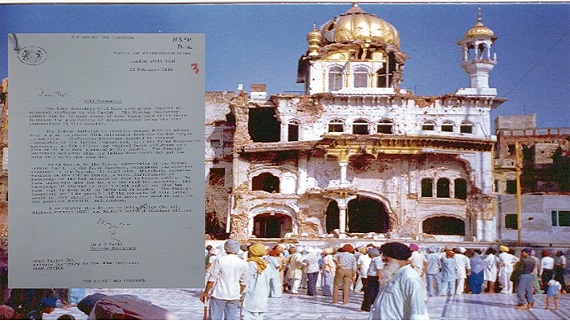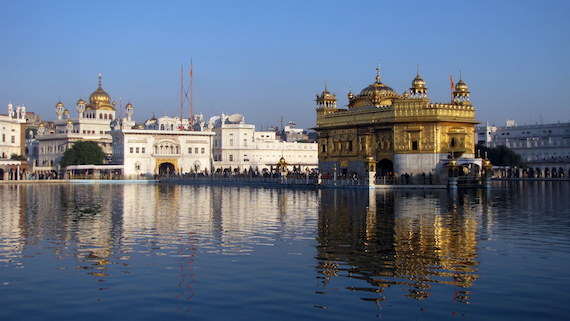Over Seas » Sikh Genocide 1984 » Sikh News
UK Defends Secrecy Over Documents Related To June 1984 Attack On Darbar Sahib
March 7, 2018 | By Sikh Siyasat Bureau
London: During the first day of the three-days proceedings at the First-tier tribunal, it seemed that the United Kingdom was trying tooth and nail to suppress and protect the documents related to its involvement in the invasion of Darbar Sahib complex from coming into public domain.

UK’s Top Secret documents declassified under 30 years rule revealed British government’s role in June 1984 attack [File Photo]
Such a desperation shown by the UK government is heating up the speculation that it had compromised rather sacrificed human rights of a particular ethnic group (in this case the Sikhs), in return for lucrative multi-million pounds defense orders from the Indian state.
The three-day proceedings in the Phil Miller versus UK Information Commissioner case at the First-Tier Tribunal in London began on Tuesday (March 6). The outcome will decide whether documents relating to Britain’s involvement in the Indian military attack on Darbar Sahib, Amritsar in June 1984 can be released in the public domain in entirety or be kept away on grounds of security and international relations.
On day one of the proceeding it is reported by the media that four witnesses give evidence: Philip Barton, director general, consular and security at the Foreign and Commonwealth Office; Owen Jenkins, former FCO director for South Asia and Afghanistan, Dabinderjit Singh of the Sikh Federation (UK) and journalist Miller.
Barton’s evidence was taken behind locked doors and even Phil Miller’s legal team was not privy to the proceedings which continued all morning and carried on after lunch.
Phil Miller took to the stand and spoke about the human rights situation in Punjab, mentioning the Special Powers Act (1983) and military action against Sikhs. “Britain cannot deny that they had no idea of what was unfolding (in Punjab). The British high commissioner had all the information.” Miller also quoted a British diplomat saying that some of the laws used against Sikhs at the tie operated in the framework of “guilty until proven innocent.”
Trade over human rights?
It was in this background, Miller pointed out, that it was important to see whether “trade concerns were trumping human rights”. The judge at one point asked if Miller was “expecting smoking guns.” Outlining his concern behind the move to get the British government to release more documents, Miller said it was crucial to understand the “context in which this decision (to provide assistance to India) was made.” To a pointed question by a judge on whether there is direct evidence of British involvement in the operations in Punjab, Miller replied in the negative, reads the statement of Phil Miller published in an English daily.

Darbar Sahib and Akal Takht Sahib [File Photo]
Furthermore, while making his point in this case Phil Miller reportedly told the court that there is a need to find out what form the British “assistance” to India took in 1984. “Assistance can mean different things. It could be training in the UK of Indian officers, selling equipment to be able to use them for internal usage.”
“The government’s review tried to downplay the motivations of arms sales and helicopter sales that were very important in UK-India relations then,” reads the quote from the statement given by his to The Wire.
Yet another reason or excuse given to justify the secrecy over the documents is that it may adversely effect the diplomatic relationship between India and Britain. But it is reported that Dabinderjit Singh of the Sikh Federation (UK) gave evidence to counter these claims. “In January 2014, when Miller got those papers, the Congress party was in power. In the run-up to the elections, the BJP talked extensively about what happened in 1984. The BJP had taken a different approach.”
Additionally, he referred to a statement given by Indian home minister Rajnath Singh that he is in favour of papers relating to 1984 operations being made public, as a testimony to India’s openness about the ghastly episode.
To Get Sikh Siyasat News Alerts via WhatsApp:
(1) Save Our WhatsApp Number 0091-855-606-7689 to your phone contacts; and
(2) Send us Your Name via WhatsApp. Click Here to Send WhatsApp Message Now.
Sikh Siyasat is on Telegram Now. Subscribe to our Telegram Channel
Related Topics: Attack on Darbar Sahib, Darbar Sahib, Human Rights Abuse in India, Indian Army, Indian Politics, Indian State, June 1984 attack on Sikhs, Punjab Politics, Sikh Diaspora, Sikh News UK, Sikhs in United Kingdom, UK and June 1984 attack on Sikhs, United Kingdom




